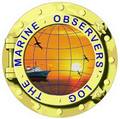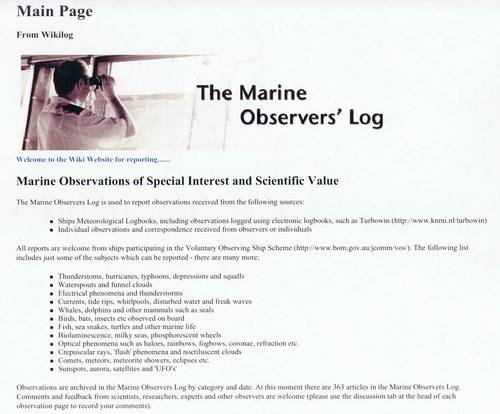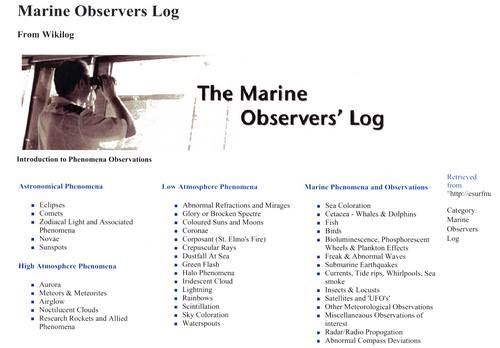
The Marine Observers' Log—"WikiLog"
Sarah North, UK Met Office & Frits Koek, Koninklijk Nederlands Meteorologisch Instituut (KNMI)Have you ever witnessed unusual meteorological conditions at sea, or observed a remarkable astronomical phenomenon during your watch? Or perhaps your ship has been visited by a school of dolphins, a pod of whales, or by some strange looking seabird? Maybe you have been surprised by a meteor or UFO racing across the night sky, or found your ship surrounded by a bioluminescent ocean?
Whenever something curious or unusual is observed at sea there is a natural inclination to want to share the experience with your colleagues on board. However, such observations may have wider scientific interest and could be of great value to researchers and experts ashore.
For many years, voluntary marine observers have been encouraged by National Meteorological Services to supplement their standard weather reports with details of any interesting or significant phenomena observed at sea. Traditionally, these observations were recorded in dedicated sections of the Ships Meteorological Logbook. Having been collected by visiting Port Meteorological Officers, these observations were often reproduced in marine publications and journals. The most interesting observations were also sent to consulting experts for their professional comments, which could then be fed back to the observer. Was it really a basking shark, a black footed albatross, St Elmo's Fire, crepuscular rays, a lunar rainbow, abnormal refraction etc. that was observed on that day in that particular location?
In recent years, the use of hardcopy logbooks has been largely phased out by many National Meteorological Services and have been gradually replaced by the use of electronic logbooks, such as TurboWin* and SEAS. While the primary function of these electronic logbooks continues to be to record the weather observations, they nevertheless include modules to allow observers to record a variety of additional observations. In particular, TurboWin logbook software, which is now in use on the majority of European Voluntary Observing Ships, includes a dedicated section to permit additional phenomena reports to be logged and transmitted back to the National Meteorological Service that recruited the ship to undertake weather observations.
Because such additional observations are now recorded in electronic format it is a comparatively easy process to transfer them to a website so that they can be accessible to everyone—observers, experts and laymen alike—who have access to the internet. To this end a dedicated new website has recently been established. Although the new website is primarily intended to provide a repository for any interesting or significant observations that have been reported by voluntary observers in electronic logbooks, reports are welcome from all legitimate sources. The site has therefore been given the title "The Marine Observers' Log" and is available to everyone.
Because the Marine Observers' Log has been developed for the web using the well established MediaWiki software, it is already becoming known by the abbreviated name "Wikilog."
An important feature of the website is the fact that it is not static. Anyone with a recognised interest in marine observing can make a request to open an account (details on the website) and add observations directly if they so wish. Each page on the site also contains a discussion tab for consulting experts, scientists, researchers, experts and other interested observers to add comments or feedback on the observations. Links from observations can also be made to related information drawn from the popular Wikipedia encyclopedia.
Observations are archived in the Marine Observers' Log by category and date. Although the website was only set up a few months, ago nearly 400 observations have already been logged. It should be noted, however, that all material included on the website is subject to copyright provisions, which must closely be observed.
It is hoped that marine observers reading the Mariners Weather Log will appreciate the value of the new website and will contribute any interesting observations they experience while at sea.
Acknowledgment—Particular thanks must be given to Pierre Blouch, E-SURFMAR Programme Manager, for all his help in setting up the new Wikilog website.
* Full details of the TurboWin programme are available at TurboWin Homepage, where copies of the program and associated utilities can be downloaded free of charge.
* Under a cooperative agreement between the National Oceanic and Atmospheric Administration (NOAA) and the U.S. Coast Guard (USCG), software has been created to assist Volunteer Observing Ships (VOS) in submitting marine weather reports and participating in the Automated Mutual-assistance VEssel Rescue system (AMVER). For Information on AMVER contact:
Ben Strong 1-212-668-7762
e-mail: bmstrong@batteryny.uscg.mil
http://www.amver.com/
* NOAA's SEAS (Shipboard Environmental data Acquisition System) program relies on volunteer observers to report weather at least four times per day at 00Z, 06Z, 12Z, and 18Z.For Information on SEAS contact: Your nearest U.S. Port Meteorological Officer or SEAS representative or visit the SEAS website at: http://seas.amverseas.noaa.gov/seas/


